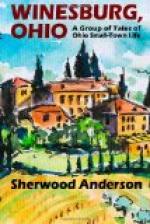In George Willard’s room, which had a window looking down into an alleyway and one that looked across railroad tracks to Biff Carter’s Lunch Room facing the railroad station, Seth Richmond sat in a chair and looked at the floor. George Willard, who had been sitting for an hour idly playing with a lead pencil, greeted him effusively. “I’ve been trying to write a love story,” he explained, laughing nervously. Lighting a pipe he began walking up and down the room. “I know what I’m going to do. I’m going to fall in love. I’ve been sitting here and thinking it over and I’m going to do it.”
As though embarrassed by his declaration, George went to a window and turning his back to his friend leaned out. “I know who I’m going to fall in love with,” he said sharply. “It’s Helen White. She is the only girl in town with any ‘get-up’ to her.”
Struck with a new idea, young Willard turned and walked toward his visitor. “Look here,” he said. “You know Helen White better than I do. I want you to tell her what I said. You just get to talking to her and say that I’m in love with her. See what she says to that. See how she takes it, and then you come and tell me.”
Seth Richmond arose and went toward the door. The words of his comrade irritated him unbearably. “Well, good-bye,” he said briefly.
George was amazed. Running forward he stood in the darkness trying to look into Seth’s face. “What’s the matter? What are you going to do? You stay here and let’s talk,” he urged.
A wave of resentment directed against his friend, the men of the town who were, he thought, perpetually talking of nothing, and most of all, against his own habit of silence, made Seth half desperate. “Aw, speak to her yourself,” he burst forth and then, going quickly through the door, slammed it sharply in his friend’s face. “I’m going to find Helen White and talk to her, but not about him,” he muttered.
Seth went down the stairway and out at the front door of the hotel muttering with wrath. Crossing a little dusty street and climbing a low iron railing, he went to sit upon the grass in the station yard. George Willard he thought a profound fool, and he wished that he had said so more vigorously. Although his acquaintanceship with Helen White, the banker’s daughter, was outwardly but casual, she was often the subject of his thoughts and he felt that she was something private and personal to himself. “The busy fool with his love stories,” he muttered, staring back over his shoulder at George Willard’s room, “why does he never tire of his eternal talking.”
It was berry harvest time in Winesburg and upon the station platform men and boys loaded the boxes of red, fragrant berries into two express cars that stood upon the siding. A June moon was in the sky, although in the west a storm threatened, and no street lamps were lighted. In the dim light the figures of the men standing upon the express truck and pitching the boxes in at the doors of the cars were but dimly discernible. Upon the iron railing that protected the station lawn sat other men. Pipes were lighted. Village jokes went back and forth. Away in the distance a train whistled and the men loading the boxes into the cars worked with renewed activity.




